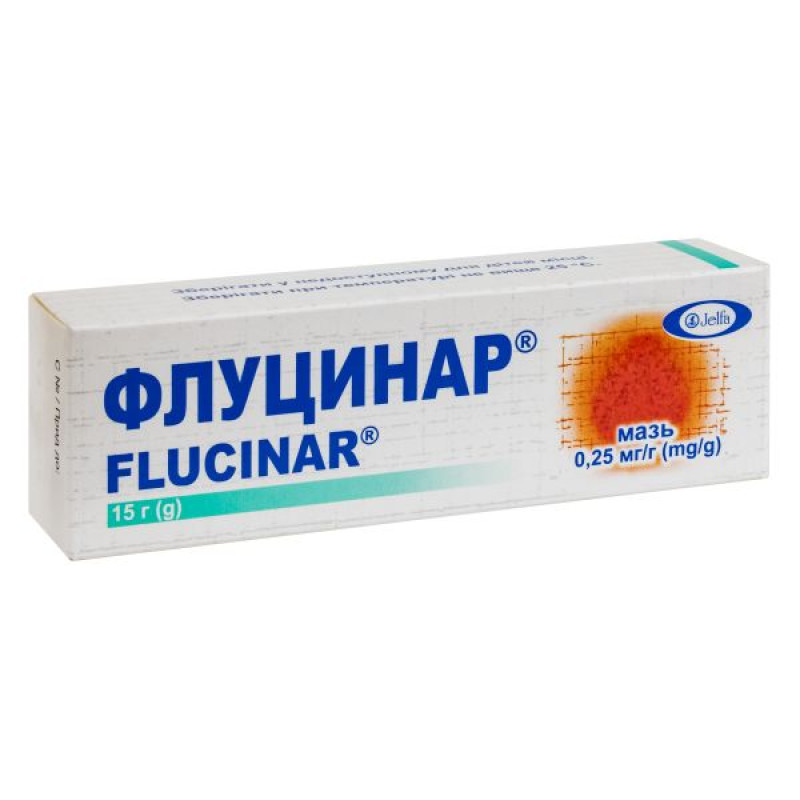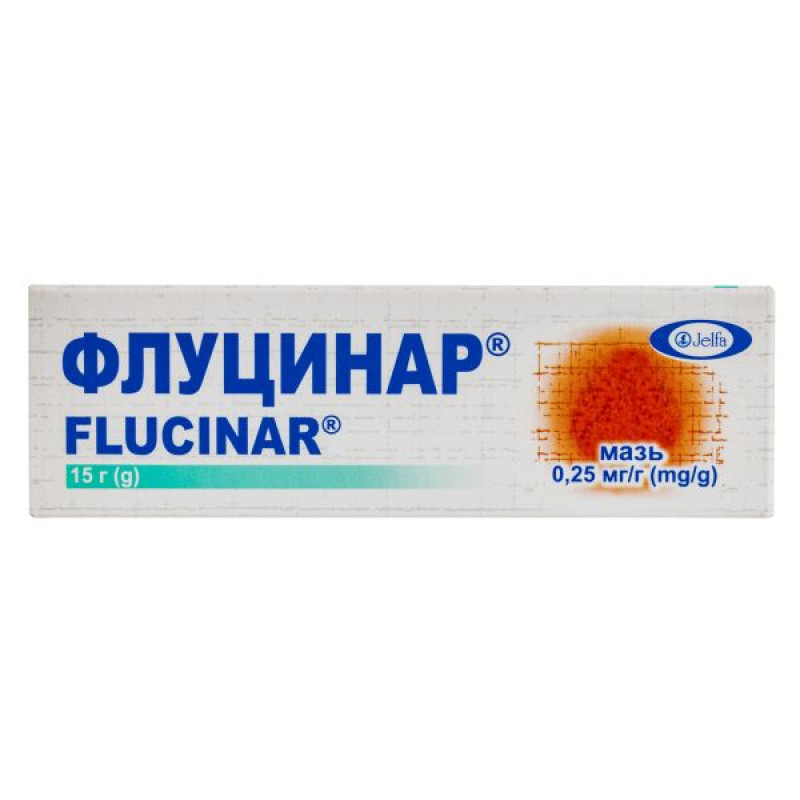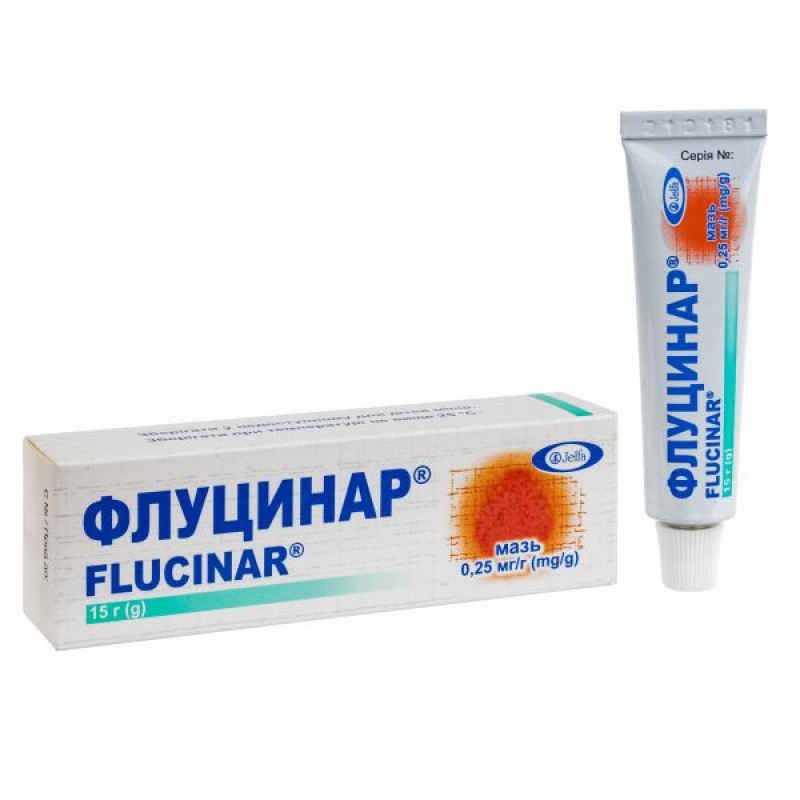Flucinar ointment 0.25 mg/g tube of 15 g

Instructions Flucinar ointment 0.25 mg/g tube 15 g
Composition
active ingredient: fluocinolone;
1 g of ointment contains fluocinolone acetonide 0.25 mg;
excipients: propylene glycol, citric acid, lanolin, white soft paraffin.
Dosage form
Ointment.
Main physicochemical properties: white or almost white, oily, soft, translucent mass with a specific faint odor.
Pharmacotherapeutic group
Corticosteroids for use in dermatology. ATX code D07A C04.
Pharmacological properties
Pharmacodynamics
Fluocinolone acetonide is an effective synthetic glucocorticosteroid for external use. When used in the form of an ointment at a concentration of 0.25 mg/g, it has a strong anti-inflammatory, antipruritic, antiallergic and vasoconstrictor effect. It has lipophilic properties and is easily absorbed through the skin. After applying 2 g of ointment, the production of adrenocorticotropic hormone (ACTH) by the pituitary gland may decrease as a result of suppression of the adrenal-pituitary system.
Pharmacokinetics
Fluocinolone acetonide easily penetrates the stratum corneum of the skin, where it gradually accumulates and is detected even 15 days after application. It is not biotransformed in the skin. After absorption, it is systemically biotransformed, mainly in the liver. It is excreted in the urine and in smaller quantities in the bile, mainly in the form of a compound with glucuronic acid, and also in a small amount in an unchanged state.
Absorption of fluocinolone acetonide through the skin is increased when applied to sensitive skin in the anatomical folds of the body and face, as well as to skin with damaged epidermis or inflammation. The use of an occlusive dressing causes an increase in skin temperature and humidity, which also leads to increased absorption of fluocinolone acetonide. In addition, absorption is increased when the drug is applied frequently and to large areas of skin. Absorption through the skin is higher in adolescents than in adult patients.
Indication
Short-term treatment of acute and severe non-infectious inflammatory skin diseases (without exudation) accompanied by persistent itching or hyperkeratosis: seborrheic dermatitis, atopic dermatitis, nodular urticaria (papular urticaria), allergic contact dermatitis, erythema multiforme, tuberculous lupus, psoriasis, lichen planus.
Contraindication
Skin manifestations of syphilis, skin tuberculosis, pyoderma, chickenpox, herpes, actinomycosis, blastomycosis, sporotrichosis, diaper dermatitis, anogenital itching, nevus; atheroma, hemangioma, xanthoma, skin neoplasms, wounds and ulcerative lesions of the skin, wounds in the application areas, numerous psoriatic plaques, trophic ulcers associated with varicose veins, erosive-ulcerative lesions of the digestive tract.
The ointment should not be used for bacterial, viral and fungal skin infections, acne vulgaris and rosacea, perioral dermatitis (dermatitis perioralis), after prophylactic vaccinations, as well as in case of confirmed hypersensitivity to fluocinolone acetonide or to other glucocorticosteroids and to other components of the drug.
Interaction with other medicinal products and other types of interactions
The drug can be used with antimicrobial agents of local and systemic action. Concomitant use with systemic glucocorticosteroids increases the effectiveness of the drug, but at the same time increases the likelihood of side effects. Concomitant use of the drug with nonsteroidal anti-inflammatory drugs increases the risk of systemic and local side effects. May enhance the effect of hypotensive, diuretic, antiarrhythmic drugs, potassium preparations. Diuretic drugs (except potassium-sparing) increase the likelihood of hypokalemia. During treatment with the drug, it is not recommended to be vaccinated against smallpox, as well as to carry out other types of immunization (especially with prolonged use on large areas of the skin) due to the possible lack of an adequate immunological response in the form of the production of appropriate antibodies.
The drug may enhance the effect of immunosuppressive and weaken the effect of immunostimulating drugs.
Application features
Treatment must be carried out under the supervision of a doctor.
Before each re-application of the drug, the remnants of the ointment from the previous application should be washed off with soapy water or an antiseptic solution. It is recommended to wear loose clothing during treatment. Do not apply to the skin of the mammary glands.
Do not use the cream simultaneously with other medicines for external use.
Periodic monitoring of adrenal function by determining cortisol levels in the blood and urine after adrenal stimulation with ACTH is indicated during long-term use.
Do not use the drug for more than 2 weeks without a break. With long-term use on large areas of the skin, the frequency of side effects increases and the possibility of developing edema, arterial hypertension, hyperglycemia, and a decrease in the body's resistance increases.
When using the drug externally, the following are possible: a decrease in the production of adrenocorticotropic hormone by the pituitary gland due to suppression of the adrenal-pituitary system, a decrease in the level of cortisol in the blood, and the development of iatrogenic Cushing's syndrome, which disappears after discontinuation of the drug.
In case of infection at the site of application of the ointment, appropriate antibacterial or antifungal treatment should be carried out. If the symptoms of infection persist, the use of the drug should be discontinued for the period of treatment of the infection.
Application of the drug to the eyelids or skin around the eyes should be avoided in patients with angle-closure and open-angle glaucoma, as well as in patients with cataracts due to possible exacerbation of disease symptoms.
Visual impairment is possible with the use of systemic and topical corticosteroids.
If symptoms such as blurred vision or other visual disturbances occur, an ophthalmologist should be consulted to evaluate possible causes, which may include cataracts, glaucoma, or rare diseases such as central serous chorioretinopathy, which has been reported with the use of systemic and topical corticosteroids.
Avoid contact with eyes. If skin irritation occurs at the site of application, discontinue use.
Use on the skin of the face and underarms only if absolutely necessary, as there is a possibility of increased absorption and a high risk of side effects (telangiectasia, dermatitis perioralis), even after short-term use.
The drug should be used with caution in the presence of subcutaneous tissue atrophy, especially in the elderly.
Since the medicine contains propylene glycol, it may cause skin irritation upon application.
Since the medicinal product contains lanolin, its use may cause a local reaction (e.g. contact dermatitis).
Ability to influence reaction speed when driving vehicles or other mechanisms
The drug does not limit mental and motor abilities, as well as the ability to drive vehicles and mechanisms.
Use during pregnancy or breastfeeding
The drug is contraindicated during pregnancy. Breastfeeding should be discontinued during treatment with the drug.
Method of administration and doses
The drug is intended for topical use. The ointment should be applied in a thin layer to the affected skin 1-2 times a day.
The ointment should not be applied under an occlusive dressing. Only in the case of psoriasis is it permissible to use an occlusive dressing, which should be changed every day.
Treatment should not be continued for more than 2 weeks. It should not be used on the face for more than 1 week. It is recommended to use no more than 15 g of ointment (1 tube) during a week.
The drug should be used with caution under the supervision of a physician in children over 2 years of age, only once a day, on a small area of skin; do not apply to the face.
Children
The medicine should not be used in children under 2 years of age.
Overdose
With prolonged use on large areas of the skin, symptoms of overdose may appear, manifested by increased adverse reactions, including burning of the skin at the site of application of the drug, glycosuria, edema, arterial hypertension, decreased body resistance to infections. Itching, hyperglycemia, Itsenko-Cushing syndrome are possible. Treatment is symptomatic against the background of gradual withdrawal of the drug.
Adverse reactions
Skin and subcutaneous tissue disorders
Acne-like lesions, post-steroid purpura, epidermal growth inhibition, burning, itching, irritation, rash, atrophy of subcutaneous tissue, dry skin, excessive body hair growth or alopecia, depigmentation or hyperpigmentation of the skin, atrophy and disruption of skin integrity, telangiectasias, furunculosis, atrophic streaks, secondary infections, local skin reactions (including perioral, contact, allergic dermatitis). In some cases, urticaria or maculopapular rash may appear, as well as exacerbation of existing pathological lesions.
From the organs of vision
When applied externally to the skin of the eyelids, cataracts or glaucoma may sometimes develop.
Blurred vision is possible.
Systemic disorders
The use of ointment under an occlusive dressing, given the increased absorption, can cause a strong systemic effect, manifested in the form of edema, arterial hypertension, and a decrease in the body's resistance to infections.
Systemic adverse effects
Secondary immunodeficiency (exacerbation of chronic infectious diseases, generalization of the infectious process, development of opportunistic infections), gastritis, steroid gastric ulcer, hyperglycemia, glycosuria, slowing of reparative processes, adrenal insufficiency, growth and development inhibition in children, Itsenko-Cushing syndrome.
On the part of the immune system
Allergic or hypersensitivity reactions are possible.
Expiration date
3 years.
Storage conditions
Store at a temperature not exceeding 25 ° C. Keep out of the reach of children.
Packaging
15 g in a tube; 1 tube in a box.
Vacation category
According to the recipe.
Producer
Pharmaceutical factory Elfa A.T.
Location of the manufacturer and its business address
58-500 m. Jelenia Góra, 21 Vincentiego Pola Street, Poland.
There are no reviews for this product.
There are no reviews for this product, be the first to leave your review.
No questions about this product, be the first and ask your question.








